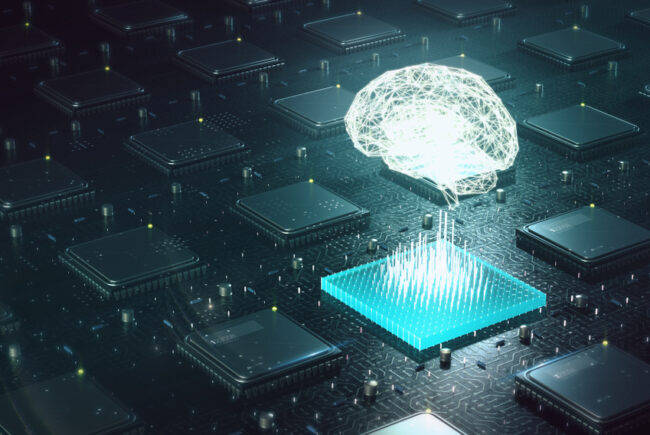

Whereas AI works with existing, known data that is analysed and evaluated, the objective of skills acquisition is to cope with future, unknown problems. Photo: Shutterstock
Whereas AI works with existing, known data that is analysed and evaluated, the objective of skills acquisition is to cope with future, unknown problems. Photo: Shutterstock
As the first steps are being taken to use artificial intelligence to support the acquisition of skills, many questions remain unanswered. The text is an essay written for issue 1/2021 on Future of Adult Education.
Jan logs into the system and continues learning from where he left off. Today he’s arranged to learn with Tina. The system brought the two of them together as they have similar learning interests and are on approximately the same learning level. As soon as Tina logs into the system, Jan is informed and both can use video chat to work on their tasks collaboratively.
This scenario is already closer than we think.
The vision of using technology to support learning processes is nothing new. In broad terms we can compare it to book printing, a technology that made learning material available to the masses. The role of technology as an educational medium has long been considered in didactics.
Things became more exciting when attempts were made to use technology to support the teaching-learning process. The learning machines of the 1950s and 60s were merely formative, neglecting internal psychological processes and understanding learning merely as a conditioning. They did not prove to be particularly effective in skill building.
In the 1970s we saw intelligent tutoring systems (ITS) and adaptive learning environments emerge. Systems were developed on the basis of Bloom’s mastery learning philosophy to provide a personalising learning experience using set patterns.
They were, however, criticised by educators and educational psychologists because the finite number of possibilities available meant that they ultimately did not demonstrate the individualised reactions to learner behaviour that a teacher or a classmate could. Instruction was largely programmed (albeit branched). Development costs were also so great that they were not proportionate to the expected benefit.
Happy coincidences in learning
Current developments see artificial intelligence (AI) as an opportunity to improve the cost-benefit ratio. Self-learning algorithms allow ITS to support the work of teachers and bring learners together to promote collaborative learning. Big data on digital learning system user behaviour provide the foundation.
Although there is too much information for a single teacher to draw helpful conclusions during the learning process, these volumes of data are important for functioning AI systems. It is hoped that, in addition to its learning support function in ITS, AI will also perform some of the teachers’ administrative tasks (e.g. marking tests) and provide educational content.
Until now, every possible learning pathway had to be created and its branches precisely defined.
A Federal Ministry of Education and Research (BMBF)-funded project to optimise the EULE web-based learning environment on the German Institute for Adult Education’s wb-web portal will build on this idea when it is launched in May 2021.
Wb-web offers adult and further education teachers many opportunities to further their educating skills, and the platform is being upgraded into a multi-agent system (MAS) with AI research and development partners.
In the future the MAS will make learning content more readily available to learners and support peer learning by assigning platform users to other people with similar learning profiles who are on the platform at the same time.
This enhancement also makes it easier to develop learning opportunities. Until now, every possible learning pathway had to be created and its branches precisely defined. The route taken by individual learners was determined by learner data.
With artificial intelligence the MAS can assume part of this task by making criteria-based suggestions on new learning pathways as well as branching. If serendipitous learning pathways prove to be promising, they will be established in the learner agent and suggested more frequently.
Many questions remain unanswered
Even if, or better still – because – the first steps are being taken to use AI to support the acquisition of skills, many questions remain unanswered.
Whereas AI works with existing, known data that is analysed and evaluated, the objective of skills acquisition is to cope with future, unknown problems. Can these approaches be successfully combined?
Algorithms use mass information. Human learning processes are individual and focus on heterogeneity. Is it possible for AI to support individual learning based on big data? Can AI educational processes be completely mapped by algorithms or is the process of teaching always situational, diffuse and non-technical, since didactic planning also includes surprises?
Pedagogues are still needed to realise effective learning opportunities or to provide expert support in AI design. This opens up new fields of work. Our journey has only just begun.
Literature:
Heimann, Paul; Otto, Gunter; Schulz, Wolfgang (1977): Unterricht. Analyse und Planung. 9th edition, unrevised Ed. Hannover Schroedel.
Schulmeister, Rolf (2004): Diversität von Studierenden und die Konsequenzen für eLearning. In: Doris Carstensen und Beate Barrios (Hg.): Campus 2004. Kommen die digitalen Medien an den Hochschulen in die Jahre? Münster u.a: Waxmann, pp. 133–144. Available online.
Siebert, Horst (2019): Didaktisches Handeln in der Erwachsenenbildung. Didaktik aus konstruktivistischer Sicht. 8th edition. Augsburg: ziel (Grundlagen der Weiterbildung).
Tahiru, Fati (2021): AI in Education: A Systematic Literature Review. In: Journal of Cases on Information Technology 23 (1).






